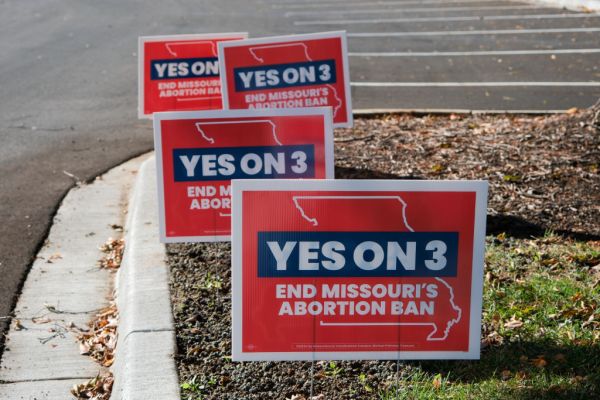Happy Monday! And on this Veterans Day, a hearty thank you to all the current and former members of the U.S. military who have bravely and nobly served this country. We’re grateful for your service and devotion.
Quick Hits: Today’s Top Stories
- The Justice Department on Friday unveiled charges against three men involved in an Iranian plot to assassinate former President Donald Trump and dissident Masih Alinejad. Two New York City-based men have been arrested in connection with the scheme to kill Iranian-American Alinejad—who has been targeted before—at the direction of a third Afghan national, whom the DOJ identified as an Iranian asset and who is still at large in Iran. Farhad Shakeri—who emigrated from Afghanistan to the United States as a child but was deported after serving time for armed robbery—told law enforcement that Iran’s Islamic Revolutionary Guard Corps had tasked him with devising a plot to kill the former president in the weeks before the election.
- Ukrainian forces on Sunday launched perhaps their largest drone attack of the war against Russia, with some of the drones approaching Moscow and diverting flights from three major airports in the region. The attack, which Russia claimed it had mostly thwarted by shooting down some 80 drones, followed a significant drone attack on Ukraine the previous night. Meanwhile, two Russian “decoy” drones, used to confuse Ukrainian air defenses, reportedly crashed deep in Moldovan territory early on Sunday. The Washington Post reported Sunday that President-elect Donald Trump spoke on the phone to Russian President Vladimir Putin and urged him not to escalate the conflict in Ukraine, reminding him of the United States’ “sizable military presence in Europe.”
- Qatari officials said Saturday they were pausing their efforts to mediate a ceasefire deal between Israel and Hamas, claiming the two parties have not shown a “willingness and seriousness to end the brutal war.” The Gulf nation has reportedly also ordered Hamas’ leaders, who have headquarters in the country, to leave, in light of the gridlocked negotiations. Meanwhile, Israeli Prime Minister Benjamin Netanyahu said Sunday that he’d spoken to President-elect Trump three times in recent days. According to Axios, the Israeli leader plans to dispatch an envoy to Trump’s hotel at Mar-a-Lago this week.
- Newly appointed Israeli Defense Minister Israel Katz said on Sunday that Hezbollah, the Iran-backed terrorist organization in Lebanon, had been defeated on the battlefield. “The blows we inflicted defeated Hezbollah, and the elimination of [Hezbollah leader Hassan] Nasrallah is the crowning jewel,” he said. Meanwhile, the Israel Defense Forces continued to launch attacks against targets in Lebanon, Gaza, and Syria over the weekend.
- Tens of thousands of people marched in Valencia, Spain, on Saturday to protest the government’s handling of recent flooding in the region that killed more than 220 people. The demonstrators—who at times clashed with police and vandalized buildings—called for the resignation of the regional president, Carlos Mazón, over what they say was his government’s sluggish and insufficient response to the historic natural disaster.
- A Federal Emergency Management Agency (FEMA) employee was fired after the Daily Wire reported she told members of her team canvassing houses in Florida in the aftermath of Hurricane Milton not to approach houses advertising support for Donald Trump. According to the Daily Wire’s reporting, at least 20 homes with Trump signs or flags were skipped by FEMA canvassers and “not given the opportunity to qualify for FEMA assistance.” “This was reprehensible,” FEMA Administrator Deanne Criswell said Saturday. “I want to be clear to all of my employees and the American people, this type of behavior and action will not be tolerated at FEMA and we will hold people accountable if they violate these standards of conduct.” GOP Rep. James Comer of Kentucky said over the weekend that the House Oversight Committee would hold a hearing later this month to investigate the agency.
- The Associated Press and other network decision desks called Arizona for Trump on Saturday night, meaning the former president officially swept all seven swing states in the 2024 election and secured 312 electoral votes to Vice President Kamala Harris’ 226. President Joe Biden announced Saturday that he and Trump are set to meet at the White House at 11 a.m. on Wednesday.
- Also on Saturday, the Associated Press called Nevada’s U.S. Senate race for the Democratic incumbent, Sen. Jacky Rosen, over Republican Sam Brown. The U.S. Senate race in Arizona between Democratic Rep. Ruben Gallego and Republican Kari Lake remains too close to call by the Associated Press’ count, though Gallego leads and other decision desks have called the race for him. If that result holds, Republicans will have a 53-47 Senate majority in the next Congress. Republicans are also just four seats away from securing a majority in the House of Representatives, with three net pickups for Republicans and 18 races yet to be called.
Knives Out Following Harris’ Loss

Republicans won the White House—and the popular vote—after nominating a twice-impeached convicted felon who is the only president in the history of modern polling to never reach a 50 percent approval rating. The GOP also secured a healthy Senate majority and will likely soon complete its governing trifecta after a few more House races are called.
Democrats are all trying to find the guy who did this.
Elected Democrats, party operatives, and campaign staffers of all stripes have spent the five days since the election conducting an initial post-mortem, trying to figure out what and whom to fault for President-elect Donald Trump’s resounding victory. The conversation includes a healthy dollop of inside-the-beltway jockeying and palace intrigue, but how Democrats muddle their way through this fleeting moment when the wounds are still raw could define what the party stands for moving forward.
On the surface, President Joe Biden and Vice President Kamala Harris have had nothing but nice things to say about one another. Behind the scenes, however, their respective aides have been waging an increasingly hot proxy war over who is ultimately responsible for Trump’s return to the White House.
“We dug out of a deep hole but not enough,” David Plouffe, a senior adviser to the Harris campaign, tweeted Wednesday before deleting his account the following day. A person involved with the Harris team told Axios, “the 107-day Harris campaign was nearly flawless,” but, “the Biden campaign that preceded it was the opposite.”
White House spokesman Andrew Bates said last week that “anyone criticizing the vice president’s campaign is at odds with President Biden,” but that hasn’t stopped anonymous figures from the president’s orbit from taking shots. “How did you spend $1 billion and not win,” a former Biden staffer told Axios of the Harris campaign’s war chest, which it reportedly blew through. “What the f—?”
Some reports suggest the Harris campaign—an odd hybrid of Biden staffers, younger operatives, and a handful of veteran Harris advisers—suffered from mismanagement: financial and internal leadership challenges due to both inexperienced staff and rigid, top-down management. “If you look at Tammy Baldwin, Jacky Rosen, Ruben Gallego, and even Bob Casey in many ways—if you believe that campaigns matter and that’s why the results are a little different, then you have to say that she lost because of her campaign,” an operative close to the campaign told NOTUS. “The other way to do it is, maybe campaigns don’t matter at all,” they said. “Then why are we even campaigning at all on anything?”
The operational and tactical faults of the Harris campaign will continue to be litigated in public and private. Philadelphia Democratic Party Chairman Robert Brady blamed the vice president’s team for lower voter turnout in the city, claiming the campaign didn’t pony up enough money for get-out-the-vote efforts. “If there’s any immediate takeaway from Philadelphia’s turnout this cycle,” Harris campaign senior adviser Brendan McPhillips said in response to Brady’s accusation, “it is that Chairman Brady’s decades-long practice of fleecing campaigns for money to make up for his own lack of fundraising ability or leadership is a worthless endeavor that no future campaign should ever be forced to entertain again.”
But an emerging view among Democratic operatives holds that there’s little the Harris campaign could have done to change the outcome of a 107-day campaign. “There were strong headwinds against us,” Robert Flaherty, the Harris deputy campaign manager, reportedly said in a meeting the morning after the election. “And it would have been even worse if it wasn’t for us.”
That’s Thesis No. 1 among many Democrats: Biden lost the election. His decision to plow ahead and run for reelection despite initially running in 2020 as a bridge candidate—and his advisers’ decision to shield his decline from scrutiny for so long—has already come under fire. “He shouldn’t have run,” argued Jim Manley, a top aide to former Democratic Senate Majority Leader Harry Reid. “This is no time to pull punches or be concerned about anyone’s feelings. He and his staff have done an enormous amount of damage to this country.”
Former House Speaker Nancy Pelosi, one of the central actors in Biden’s exit, suggested in an interview over the weekend that an earlier, open primary would have been better for Democrats. “Had the president gotten out sooner, there may have been other candidates in the race,” she told the New York Times. “Kamala, I think, still would have won, but she may have been stronger, having taken her case to the public sooner.”
The remark was at odds with how she described Harris’ ascension in a September interview. “We had an open primary and she won it,” she said. “Nobody else got in the race because she was politically astute and that was the thought.”
“I don’t think that any review of the election should be predicated on weaknesses but strengths of Kamala Harris,” Pelosi added on Saturday, pushing back against any critique of Harris’s own quality as a candidate.
But Pelosi also refused to countenance any broader criticism of Democratic strategy or vision, only noting she wished that Biden had better sold his policy message earlier in his administration. She rejected post-election criticisms from Sen. Bernie Sanders that Democrats have “abandoned working-class people.”
The “Biden’s loss” thesis necessarily raises the question: Could any Democrat have won last Tuesday? Many analysts and commentators have pointed out that 2024 was a year of global anti-incumbency. Governing parties across the ideological spectrum in developed countries— including the United Kingdom, France, Austria, Belgium, and Japan—all lost vote share, many significantly.
In light of this trend, The Atlantic’s Derek Thompson argued Harris’ loss should be viewed as the second COVID-19 election: an expression of anger and dissatisfaction people had with governments’ response to the economic emergency sparked by the pandemic, namely inflation. To borrow from David French borrowing from Sarah Isgur’s curling analogy, inflation, plus multiple international crises, plus a surge in migrants amounted to the stone that no amount of campaign “brushing” could have turned.
In short, the so-called fundamentals of the race were too steep, and the vibes, if you will, were too bad for Democrats to win.
But whatever the virtues of this explanation, Trump’s gains across almost every constituency you can think of highlight potentially more enduring areas of weakness for Democrats that some in the party could be uncomfortable confronting. “I hear from fellow Democratic staffers, who across the party are largely 20- to 30-something progressives, insist that due to inflation and global trends, no Democrat could’ve won,” a Democratic Hill staffer who also worked with the Harris campaign told TMD. “Trump was plainly beatable, but by saying he wasn’t, progressives don’t have to reckon with the fact that they’re out of step with the country.”
The staffer, who requested anonymity to speak candidly, added, “Judging from the first round of post-mortems, it seems lots of staffers are only interested in using this election as an excuse to go even further left.”
Progressive lawmakers like Sanders are certainly busy making that argument. The Vermont senator’s diagnosis is that the root of Democrats’ problems is income inequality and economic policy that’s too beholden to corporate elites. For good measure, he also threw in the lack of a guaranteed right to health care and continued U.S. military aid to Israel as core policy failings. Sen. Chris Murphy, a Connecticut Democrat, echoed Sanders’ argument about progressive economic policy. “Real economic populism should be our tentpole,” he wrote on Twitter.
Some moderate Democratic voices are skeptical of that argument. “Democrats just can’t hunker down in the far left,” Sen. Joe Manchin—the outgoing former Democrat, now independent, West Virginian who mulled a third-party presidential run—said last week. “We’ve got to work towards the middle and make decisions and govern from the middle.”
To Manchin’s point, the Biden administration’s policies were markedly more progressive than past Democratic presidencies due in part to Sanders’ role in the 2020 Democratic primary: trillions spent on infrastructure and welfare programs, a remaking of antitrust enforcement that targeted some of the country’s largest corporations, and a full-throated embrace of labor unions. It’s hard to argue additional economic and social spending that likely would have worsened inflation could have persuaded voters angry about high prices. “Democrats must return to being the party that a majority of voters believes to be saner, more reasonable, more patriotic and more in touch with their lives,” argued Matt Bennett, co-founder of the centrist think tank Third Way.
Despite the divide on the policy path forward, there seems to be more agreement among moderates and progressives that Democrats’ message on cultural issues and identity politics is alienating voters. “It’s a Democratic Party which increasingly has become a party of identity politics, rather than understanding that the vast majority of people in this country are working class,” Sanders said. The Trump campaign and its allies poured more than $100 million into ads attacking Harris’ past support for gender reassignment surgery for inmates, claiming, “Kamala’s For They/Them. President Trump is for you.”
A handful of Democrats have come out publicly arguing that the party has gone too far in its positions on gender identity. “Democrats spend way too much time trying not to offend anyone rather than being brutally honest about the challenges many Americans face,” Rep. Seth Moulton, a Democrat from Massachusetts, said last week. “I have two little girls, I don’t want them getting run over on a playing field by a male or formerly male athlete, but as a Democrat I’m supposed to be afraid to say that.” Moulton’s comments drew condemnation from state party officials and lawmakers and prompted the resignation of his campaign manager, Matt Chilliak.
“The Democrats have to stop pandering to the far left,” said Rep. Tom Suozzi, a New York Democrat who won his swing district and outperformed Harris. “I don’t want to discriminate against anybody, but I don’t think biological boys should be playing in girls’ sports.”
Sen. John Fetterman argued that Republicans weaponized the issue. “I refuse to throw members of the gay or trans communities under the bus,” he said last week. “But it’s also true, undeniably, that if someone ran for president in 2020 and pandered to that Squad mentality, or to get likes on Twitter, and they made those kinds of statements about gender, they were going to be pretty hard to defend.”
“It’s undeniable that Republicans created a really powerful message: ‘She’s for they/them, and Trump is for you,’” he added. “That was, I think, our cycle’s version of ‘where’s the beef?’ or ‘I knew Jack Kennedy, and you’re no Jack Kennedy.’”
While Democrats continue in the diagnostic phase, it remains to be seen what electoral vision the party will ultimately cohere around. Biden’s former Labor secretary, Marty Walsh, acknowledged last week that Democratic messaging isn’t resonating with people. “It’s not a pointing fingers day,” he said. “It’s a reflection day.”
It’s safe to say there’s still plenty of both kinds of days ahead for Democrats.
Worth Your Time
- Americans often blame politicians or the radical voices on social media for driving us apart. But what if the fault lies with a different kind of algorithmic automation? “Since the nineteen-sixties, much of American public life has become automated, driven by computers and predictive algorithms that can do the political work of rallying support, running campaigns, communicating with constituents, and even crafting policy,” Jill Lepore wrote for The New Yorker. “In that same stretch of time, the proportion of Americans who say that they trust the U.S. government to do what is right most of the time has fallen from nearly eighty per cent to about twenty per cent. Automated politics, it would seem, makes for very bad government, helping produce an electorate that is alienated, polarized, and mistrustful, and elected officials who are paralyzed by their ability to calculate, in advance, the likely consequences of their actions, down to the last lost primary or donated dollar. … An entire generation of Americans can no longer imagine any other system and, wisely, have very little faith in this one.”
- Jordan Watkins, the star wide receiver at Ole Miss, wasn’t always on top of the world. “Before he became a record-setting starter on a top-rated SEC offense, Watkins was that kid from nowhere,” Justin Williams reported for The Athletic. “When Watkins was 8 years old, he sobbed as he watched his mom [being] driven away in the back of a cop car. He can still hear the officer telling him, ‘Don’t worry, your mom will be back soon.’ He didn’t see her again for almost two years.” Watkins’ mother, Paula, was addicted to drugs. “‘It took me a very long time to forgive my mom for going away,’ said Watkins. ‘I hate that in retrospect, because I love my mom to death, but I was clearly acting out to show how much resentment I had toward her.’ … After 14 years, the roots have taken hold. This weekend, Paula and the family will make their regular 400-plus-mile trek to watch Watkins and the Rebels take on Georgia. Cheering on the quiet kid from nowhere.”
Presented Without Comment
Wall Street Journal: Elon Musk Made Appearance on Trump-Zelensky Call
Also Presented Without Comment
National Review: Trump Rejects [Former U.N. Ambassador] Haley and [Former Secretary of State Mike] Pompeo as Cabinet Picks, Thanks Them for Previous Service
Also Also Presented Without Comment
NBC News: Yale Introduces Class on Beyoncé’s Political and Cultural Impact
In the Zeitgeist
Following the devastating fire that collapsed the roof of Notre Dame de Paris in 2019, the eight bells of the cathedral rang out together on Friday morning for the first time in more than five years. The historic church at the heart of Paris will reopen early next month. Christmas in Paris, anyone?
Toeing the Company Line
- Senior editor Mike Warren has volunteered to answer your questions in November’s Monthly Mailbag (🔒). If you want to know more about his observations from covering the 2024 election on the road, life as the father of three boys under 10, or his love of J.R.R. Tolkien and the Beatles, drop a question in the comments here.
- In the newsletters: The Dispatch Politics crew covered the couple of Senate races that slipped through Republicans’ fingers, Nick argued (🔒) that the country deserves to have all of Trump’s nominees confirmed, Jonah implored Americans to stop bashing democracy just because they don’t like the outcomes it produces, Chis assessed (🔒) whether Republicans’ victory was because or in spite of the former president, and Hannah Anderson urged Americans to adopt humility in Dispatch Faith.
- On the podcasts: Jonah ruminated on the electorate that wasn’t in this weekend’s solo Remnant, and Jamie is joined by Rich Goldberg on today’s episode of The Dispatch Podcast to break down what a second Trump administration’s foreign policy might look like.
- On the site over the weekend: Cole Murphy praised Penguin as the better Batman villain movie of the year and Mathis Bitton reviewed Christine Rosen’s book about the loss of experience in the digital age.
- On the site today: Yuval Levin pens this week’s Monday Essay about what Trump’s victory doesn’t mean.
Let Us Know
What do you think explained the Democrats’ loss? And will they come to the right conclusions to make their party politically viable again?








Please note that we at The Dispatch hold ourselves, our work, and our commenters to a higher standard than other places on the internet. We welcome comments that foster genuine debate or discussion—including comments critical of us or our work—but responses that include ad hominem attacks on fellow Dispatch members or are intended to stoke fear and anger may be moderated.
With your membership, you only have the ability to comment on The Morning Dispatch articles. Consider upgrading to join the conversation everywhere.